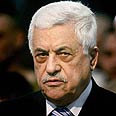
Palestinian President Mahmoud Abbas on Wednesday condemned Israel's plan to cut fuel and electricity supplies to the Gaza Strip, calling it ''an oppressive decision.''
The security cabinet approved the sanctions as a response to continuing Palestinian rocket fire out of the Gaza Strip. It says the sanctions are meant to pressure Gaza's Hamas rulers to halt the rocket attacks.
''This oppressive decision will only strengthen the choking embargo imposed on 1.5 million people in the Gaza Strip, increase their suffering and deepen their tragedy,'' Abbas' office said in a statement.
Abbas is locked in a bitter rivalry with Hamas, which overran his forces from his Fatah movement and seized control of Gaza in June. Abbas has installed a new government in the West Bank, but still claims authority over Gaza.
A spokesman for Hamas said earlier that the security cabinet's decision to declare the Gaza Strip a hostile political entity "constitutes a declaration of war" as far as the organization was concerned.
"This decision may have dangerous consequences, Hamas spokesman Fawzi Barhoum told Ynet. "Israel will be pushing the Palestinians and the Palestinian land to the extreme… such a situation might result in a humanitarian disaster.
"I find the silence and cooperation of the man in Ramallah (Palestinian President Mahmoud Abbas) with the enemy's effort to hurt Hamas, the Palestinian resistance and the Palestinian people to be very curious indeed," he said.
The cabinet's decision, added Barhoum "requires all Palestinian factions to unite against the enemy's plan… this is a deliberate attempt to coerce our people into accepting any lame solution the Washington peace conference offers through starvation.
"This is Israel attempting a knock-out blow against Hamas following its successes in taking control of Gaza," he said, warning against a military strike in Gaza and saying Hamas know "Israel doesn't need an excuse for one."
The Palestinian faction, said Barhoum, have resumed their talks recently. The decision to stop firing Qassam rockets at Israel, he added, was "not a result of Israeli intimidation, but rather a part of the new, united, Palestinian strategy."















